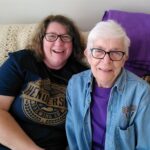It dawned on me today that I am the same age that my father was when he committed suicide.
Before I go further, do not message me to chastise me for saying committed suicide. I know that a lot of people now say died by suicide. I refuse to say that in this case. This was an act carefully planned and thoughtfully undertaken and meant to hurt others – I have the letter to prove that. It was not something that randomly happened. He did not die by shark attack. He committed to the act.
Anyway…
In my younger days, in some very dark times, what kept me from committing suicide was knowing what it would do to my family. When I was in a dark place in my teens and 20s – and there were many times I was – the idea that I would be responsible for destroying my paternal grandmother, in particular, was enough to come up with another way, ANY way, to get through the day. My Dad died just after I turned 30, and that year became one of the worst, probably the worst, of my life, both because of what he did and a lot of other circumstances – yet, by then, suicide was no longer an option to consider, as it had been when I was far younger.
So much of depression is biological – there’s no question of that. If you don’t believe that, just look at all of the successful people who kill themselves, and all the people who are facing unbelievably difficult circumstances and don’t ever consider it. I also don’t think depression is entirely biological and, absolutely, bad events can trigger depression. I don’t think the biological underpinnings of depression or extreme anxiety can be ignored, BUT, I also don’t think talk therapy and working to retrain your brain can be ignored either – it’s not a one or the other debate. My father, in many ways, reveled in thinking about all of the ways he believed he had been wronged, or all the ways he believed he lacked what he thought others had – it was how he chose to define himself for decades. He wore it like a badge of honor. But he also never got quality therapy and he never got away from all the things that triggered his depression.
My brain is different than it was in my teens and 20s. I can see it in reading my journals and thinking how I processed information and how I thought about myself. I’m not entirely sure why, on my late 50s, my brain does not work that way anymore – I don’t get as upset or as resentful about things as I did then. I think that’s from a combination of actions I’ve taken to change – to change how I spend my day, in changing where I live, in work to change how I think about things AND a change in my brain chemistry that’s come from… I don’t know what. Age? How I spend my time? Not that I haven’t had recent dark times – I’ve had some hopeless months in my 40s and 50s. But suicide is no longer an option. I hope it never is.
Years ago, Dan Savage and his partner, Terry, unintentionally started a worldwide campaign against gay teen suicide: “It Gets Better.” I’m not gay, but I identified with their advice a LOT. I know that they were emphasizing to teens that, if you tough it out and get through high school and get out of that school and town, it almost instantly gets better. But I think some of their words fit a lot of people who are struggling with the darkest of thoughts:
However bad it is now, it gets better. And it can get great. It can get awesome. Your life can be amazing. But you have to tough this period of your life out, and you have to live your life so that you are around for it to get amazing. And it can and it will.
I believe that. And not just because of my own experience, not just because of all of the amazing things I’ve experienced in my 30s and 40s and 50s. I believe it because I’ve known people who have lost everything – their homes, their families, their entire towns, and in moments, their dignity and their bodily autonomy – and I have seen how they have created and embraced their post-trauma lives. I have seen how they value just walking down a street safely. I have seen how they relish food and music. These are people who have seen the absolute worst humans are capable of, and have had the most horrible things done to them. That trauma is still a part of them, a huge part of them – but it’s not all they are. I am grateful to have had them in my life, to keep my faith in humanity – and myself – alive.
Again: things aren’t all puppies and sunshine now. I still have dark moments. I’m gutted over gaining all of the weight back that I worked so hard to lose – weight that came back largely because of perimenopause. I still sometimes spiral down when I think about how much I miss my career. But I’ve made a lot of adjustments in how I live life. I’ve been tenacious in trying to make things better for myself. I try to spend as many hours trying to improve things, trying to stay curious, as I do lamenting how much life can suck eggs.
And I also know I’m lucky: I fell in love with movies. I have had amazing friends. I was able to move away from a place where I experienced my first traumas. I’ve had amazing jobs. I’ve seen and experienced glorious moments. I found a partner to face my later years with, who loves me but also challenges me. Had I stayed where I was born, I’m not sure I would have made it.
My Dad chose to miss the weddings of all four of his children, the opportunity to have four wonderful sons and daughters-in-law, and three grandchildren and a great-grandchild. He chose to miss what very likely would have been the very best part of his life.
In contrast, I don’t think for me, at 57, that the years ahead of me are going to be the best of my life. That’s because my life up to now has been rather spectacular. However, I have so much I’m looking forward to and working towards and learning. I hope I can keep this outlook – it’s taken a while to get it, and I’m going to do all I can to keep cultivating it.
Also:
Articles telling you how to deal with depression are bullsh*t













Leave a Reply